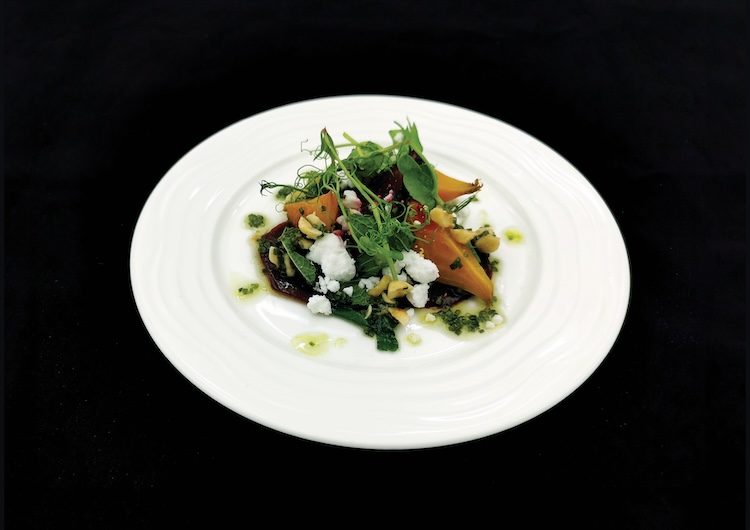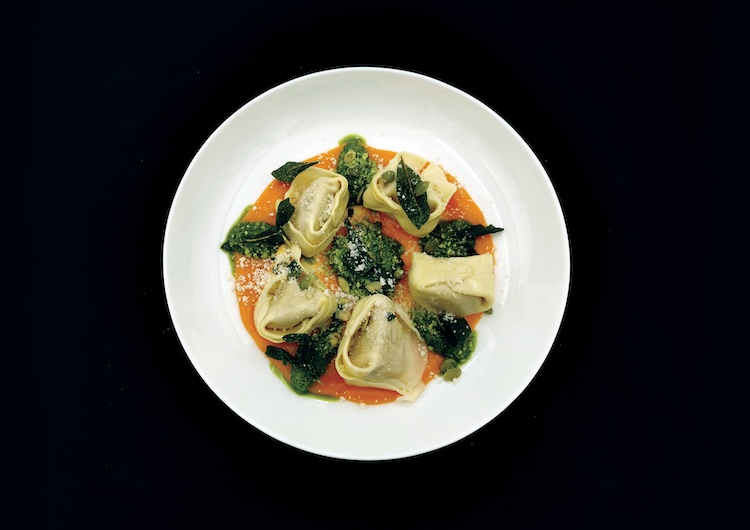Cracking the special meals code with dnata
This is a special feature from PAX International's April 2024 Special Meals issue, on page 30.

dnata’s Beetroot Carpaccio meal
Special meals have been around for decades, but as passengers’ dietary preferences and restrictions become more widely recognized, the expectation for meal options inflight is changing, and so are the industry standard guidelines for SPMLs.
PAX International spoke to Manjit Sohal, Head of Food Safety Global Performance & Compliance, dnata Catering & Retail, and Fabio Gamba, Managing Director, Airline Catering Association (ACA), about the evolving demand from airline passengers for special meals and how the updated QSAI guidelines address this global shift.

Fabio Gamba, Managing Director, ACA (left) and Manjit Sohal, Head of Food Safety Global Performance & Compliance, dnata Catering & Retail
Evolving demand for special meals
dnata Catering and Retail serves more than 127 airline customers worldwide.
“Each year, our kitchens buzz with activity as we prepare more than 111 million meals,” Sohal says, noting that the demand from passengers for special meals is growing rapidly and airlines are expanding their offerings to satisfy travellers. “More passengers are proactively pre-ordering special meals. This uptick in pre-orders isn't just a coincidence, it's driven by a growing need to accommodate diverse dietary requirements.”
These dietary restrictions range from religious to health concerns and personal preferences. Sohal says many airlines are ramping up efforts to cater to passengers with plant-based diets or specific religious dietary guidelines.
Keeping codes current
In November 2023, the Quality & Safety Alliance for Inflight Services (QSAI) and the ACA updated the QSAI Special Meal (SPML) Codes, Definitions, and Interpretation Guidelines (version 2.0). The updates went into effect on January 1, with a 12-month grace period for QSAI partners and catering organizations to adapt.
dnata was not the only player involved in developing these updated guidelines, Sohal says. Major entities including the ACA Associated Members were deeply engaged in the process. They discussed the IATA categories provided by caterers, identified special meals that might pose legal or health concerns and reviewed samples from 27 airlines.
“There were even suggestions to phase out SPMLs with questionable science or low demand,” Sohal reveals.

The pumpkin and sage tortellini dish
As Fabio Gamba, ACA Managing Director, tells PAX International, the updated special guidelines were long overdue.
“ACA and its members felt growing concern that older special meal definitions, for the most part, untouched since the early 2000s when they were first made, weren’t in line with the passengers’ expectations anymore, and that keeping outdated definitions could both generate unreasonable expectations or expose the airlines and the caterers to inappropriate liabilities,” he explains.
In 2021, Medina Quality and ACA worked together to draft a single document that would include a reduced number of SPMLs, containing some amended definitions thought to reflect the reality of the current landscape more accurately.
Gamba says that the onboard catering industry, and the airlines it serves, make it their primary objective to meet the expectations of passengers as they evolve. And more than meeting them—anticipating them.
“We [at] ACA see this Guide as a testimony of this philosophy,” explains Gamba. “Adaptation to new realities.”
As for Medina Quality’s role in the updated guidelines, Gamba says that Medina went through a similar process as ACA, circulating in parallel with a detailed questionnaire for its members on the topic of amending multiple SPMLs.
“ACA’s concomitant work, reaching out to dozens of onboard catering companies and a similar number of airlines worldwide, was felt to be very complementary,” he adds. “The decision was hence made to integrate the work ACA had done in 2020 to 2022 on the topic, with Medina’s first conclusions from the questionnaire.”
Adapting to allergen-specific SPMLs
As airlines and caterers continue to adapt the updated QSAI guidelines this year, Sohal says that dnata is hoping for a shift in the types of special meals airlines offer.
“Right now, there are a staggering 53 different SPML names linked to 39 SPML codes, which can be very overwhelming for passengers,” she explains. “At dnata, we would love to see more focus on allergen-specific SPML options.”
To Sohal, that means fewer choices that are not directly related to allergens. dnata has specialized departments to address these dietary requirements, ensuring the careful handling of allergens, right from their arrival at the facilities to storage and preparation.

